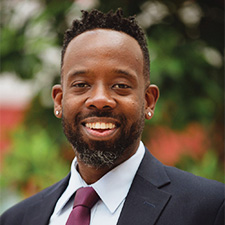
RISING TIDE

Leader Shares Insight on Elevating Families

Founder & Managing Partner, CCM Education Consulting Group and the Executive Director at the Bridge Boston Charter School
Craig Martin, Founder & Managing Partner, CCM Education Consulting Group and the Executive Director at the Bridge Boston Charter School, is an accomplished educator and school leader dedicated to whole-child learning and building a community that allows all stakeholders to achieve their dreams.
Martin was awarded the Boston Public Schools Educator of the Year in 2009 and was named Massachusetts 2018 National Distinguished Principal for his work reducing student absenteeism and suspension rates and closing the achievement gap for English language learners.
Martin relentlessly and boldly creates spaces in which “we” can thrive and blossom as whole beings.
Can you share what “whole-child learning” means to you and explain its importance in education?
Whole-child learning focuses on the cognitive, physical, academic, social and emotional facets of who a young person is. We believe each young person has their own dreams and aspirations. However, they also come with a village of caregivers and parents. And that requires a community that provides support and advocacy, if necessary. I believe when we focus on each whole scholar, including their support group, we can lift them to great heights. I see it firsthand in the K-8 community we serve.
We are creating an academic, social, and emotional wrap around our students. This full-service, parent engagement support is tailored to the individual needs and is born from the idea that our young people deserve to have people who spend time thinking about them as individuals.
“We are creating an academic, social, and emotional wrap around our students. This full-service, parent engagement support is tailored to the individual needs and is born from the idea that our young people deserve to have people who spend time thinking about them as individuals.”
-Craig Martin, Founder & Managing Partner, CCM Education Consulting Group and the Executive Director at the Bridge Boston Charter School
How does your school actively work to build community and create opportunities for families to build generational wealth?
We have incredible partnerships that go beyond our borders. We engage with several community agencies and partners that are doing incredible work to ensure our families have access and are informed. They sit with our families to listen to their needs, assess their concerns, and determine what level of support they require. Several city agencies that work with us provide virtual workshops on things like small business. They provide the tools to get someone started in business and how to make their business more efficient. It is an all-encompassing strategy to help our families understand the ways that they can build generational wealth and pass that to the next generation.
Can you discuss some of the initiatives your school has implemented to be a full-service institution for both children and families?
I am really excited about our Parent Academy Conference. We have approximately 20 to 25 partners that we work with. We work with city agencies that provide first-time home building or first-time buying support. We have some that provide transitional assistance because we’ve seen inflation greatly impact our families.
The median income for an individual in Boston to be able to thrive is around $90,000. Some of our families may just be living at the poverty line and work three jobs to pay the rent. So we have become the hub and connect them to partners who offer services like transitional housing, food services, paths to citizenship, and career advancement. Heck, we even offer support in navigating social media and creating a social media presence for our families. We offer workshops, one-on-one support, classes, and town halls to make a difference. We simply believe that for our scholars’ needs to be met, we need to be their families’ partner.
In what ways are you ensuring that all students have access to the resources and support they need to succeed academically, socially, and emotionally?
We have an internal team which is a school-based learning community that meets every week and tracks several variables on kids. We watch attendance, behavior, and academics. And if we notice changes in patterns or that a child is not thriving, teachers or parents can put in what we call a referral and we assess 6-8 weeks worth of data. If we see anything that sticks out, we pull together a care team to be a part of the ongoing conversation. This includes parents, teachers, and any advocate or child assistance program they may be a part of. We share the data and we have our cognitive experts or our special education folks, community partners, our director of family engagement, all engaged and listening. Our solutions and recommendations flow from there.
How does your school address and support the unique needs and experiences of students from diverse backgrounds?
Well, I am in a K-8 school with 335 scholars, which starts with 4-year-olds all the way to those who believe they’re paying a mortgage—aka eighth graders! Ninety-nine percent of our scholars identify as a person of color. Therefore, when that young person walks in, it’s important that the staff reflects that same level of diversity. About 40% of our staff identifies as people of color.
We also must consider the vibe within the classroom. Are the books they are reading mirroring their lived experience, their culture, their heritage? We want to make sure we are highlighting all the stuff that makes them incredibly unique and amazing. So our lessons must be focused on integrating those kids’ experiences into what they learn so they feel more comfortable to share and explore.
As an example, we make sure that our communication is diverse and multilingual. We use an app, Talking Points, that allows us to send out a message in English, and it will translate that message to the families in text or email in their primary language.
How does your school measure and track the success of its whole child and community-building efforts?
We are in year one of our strategic plan, which focuses on the overarching question about the whole child. We are very committed to ensuring that we have a great focus on that scholar’s experience and the different elements to that program that provide intervention and enrichment support. In addition, we are very thoughtful about the parent engagement and family engagement experience. We think about our investment in full service. How much do we spend; what are we spending it on? Are we building supports and interventions that will meet their needs? And then we assess our investment in talent and recruitment by making sure that we remain competitive with teacher pay, strengthen adult culture through some of our diversity programs, and regularly check with staff on their sense of belonging. But we are in year one of a 3-year plan and we meet regularly as a team, as a senior leadership team, to look at the results, share it with our board, and meet with the community on a quarterly basis.
What advice would you give to other school leaders looking to implement similar initiatives and become a full-service institution for their students and families?
Look into implementing similar initiatives and become a full-service institution for the students and families. You must do a self-assessment on what is strong and powerful about your school and about what you offer. Do some real specific work on how your offering adds value to your mission, goals, priorities, and investments. Where you see true impact, you will see new energy. One great example of where we saw great value was helping to provide citizenship support, because we have a small but a very significant number of families that are migrating from other countries. So we built a partnership with a citizenship organization that can help some of our families who are coming from other countries. The result is a total community enrichment. My other recommendation is to investigate the Institute for Educational Leadership. They are a great resource as well.


